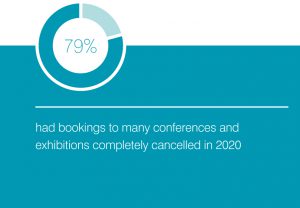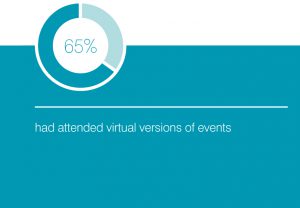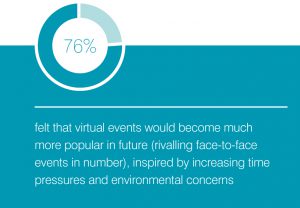Are They Remotely Relevant?

A survey of professional opinion on virtual events in the medical device and pharmaceutical industries
Summary
Owen Mumford Pharmaceutical Services commissioned research to assess delegate opinion on pharmaceutical and medical device industry events which had to be virtualised during 2020. While respondents were highly critical of many virtual events which fell short of expectations (in terms of content, technical platforms, interactivity, price, etc), there was also consensus that virtual events would form a greater proportion of workshops, conferences and exhibitions of the future. This study is a wake-up call for event organisers to re-think the event experience and re-invent business models to satisfy the critical points raised by respondents.
COVID-19, the events industry and virtualisation
Up until the advent of COVID-19, the business events industry was economically massive. One key analyst report on the industry tells us that its direct spend was over $1 trillion, generating over $600 billion in GDP. Judging by recent official figures i, that made the industry equivalent to the 23rd largest economy in the world, somewhere between Taiwan and Sweden.
Now, the whole game has changed. COVID-19 has transformed the landscape. Major industry players among events organisers have reported up to 90% drop in revenuesii. Global corporations are moving their conferences onto the digital spectrum.
Virtual events have stepped to front of stage. The talk is all about ‘pivoting’ to online formats, and event organisers are rushing to invent new ways of making their conferences and exhibitions function in a virtual world. This is great news for software and platform providers but the key question remains hovering in the minds of organisers and delegates alike: ‘Are virtual events a suitable replacement for their face-to-face equivalents?’
In order to provide some early insight into this question specifically in the pharmaceutical and medical device industry, Owen Mumford Pharmaceutical Services commissioned research among top pharmaceutical manufacturersiii. Conducted as a qualitative exercise, respondents were asked to give their opinion, based on experience of virtual events throughout 2020, of what has worked and what has not.
What, then, had been the 2020 experience in terms of industry event attendance? To provide a canvas for their qualitative opinions, respondents reported that:-



Analysis of respondents’ qualitative opinions then revealed a number of key themes expressed by a majority of those participating in the study.
Denis Marteau
General Manager, Pharmaceutical Services at Owen Mumford
Virtual events in the medtech and pharma industries – key findings
Standards of satisfaction
Most respondents noted that any virtual industry events they had attended in 2020 presented polarised standards: “Some were beneficial, some were terrible. I’ve been an attendee, a panel moderator, a presenter and I’ve been in the organising committee for some this year, so I’ve had the full experience.” In short, criticism of virtual events was most vehement where face-to-face methods had been simply ported online, with little thought about whether this would work satisfactorily for delegates.
Some delegates believed that there is just a small window of opportunity for virtual events to catch on or not. One commented, “I think it’s still very new and if everything goes badly, people might want to go back to the old way. Yet, I imagine that there should logically be more events moving online. I can’t imagine that the world isn’t going to change to some extent towards remote and virtual.”
Technology platforms
Reliable technology is a clear priority: “The event should be powered by easily accessible technology which everyone can get into whatever their firewall might be.” Nor is it simply a matter of technology platforms. One participant noted, “You will not in many (most?) cases have the full attention of the attendees, so the conferences need to be slicker and more attention-grabbing, with a recognisable data component to prove the points being made.”
In fact, the whole nature of the virtual event has to be strategically re-thought, in the view of most respondents. One pointed out that “If it’s going to be a virtual event and it’s going to draw people in, it’s got to be really well done. That isn’t just throwing an agenda on Zoom and have everybody calling. There’s got to be something creative about it, to draw people in.”
There is certainly a widely held view that more thought, research, consultation and imagination needs to go into the virtual industry event of the (near) future. ‘Authenticity’ is a desirable quality for most respondents, neatly summarised by one: “I think all of us during the pandemic have matured in the ability to use live-video screening technology, and so fear of the technological issues associated with that aspect of it were perhaps a little bit unfounded. It also confirmed that other things can go wrong that have nothing to do with the presenter being live screen or interactive or choppy. I think our tolerance for imperfect video displays (not highly-polished webinar conversations) actually helps make these conversation feeling more authentic, more like a real conversation. Virtual conferences that I’ve enjoyed the most were all 100% live.”
The issue of networking
It was the view of the overwhelming majority that virtual events were particularly poor at recognising the importance of networking with other delegates. “You will kind of lose some of that networking opportunity, so it’s good to know what [precise content] the event is really offering since you’re not getting that natural networking that you will get in person,” noted one respondent. Another added, “What is missing from these digital events is more vivid interaction and networking. We usually attend events not just to stay informed on what’s happening in the industry, but also to meet our network of partners and people we collaborate with.” Overall, there was a collective desire to see more thought and effort devoted to online methods of facilitating networking between delegates.
Olivia Houselander
Business Development Manager at Owen Mumford Pharmaceutical Services
Quality, actionable content
When it comes to the type of content that would attract delegates to virtual events, consensus could be seen across several main themes.
First, respondents wanted to see organisers devoting more budget to participation, presentations and interaction with real thought-leaders in the industry: “You have to invest more in star speakers. Normally [the thought leaders] are people from big pharma or device suppliers, or they are consultants, or they’re people that work for health authorities, like the FDA/EMA, or people who have retired from positions like that and have a lot of knowledge and understanding to share.”
Respondents also agreed that virtual events need to offer tangible, practical take-aways to justify their cost (in money and time spent): “As a business, we’d stand back and say… getting fast to market, getting commercial approval, being able to share some kind of benchmarks between our company and other companies, how we perform… having a benchmark to compare and understand the average in our disease segments, so we know where we are at.” A host of other specific topics were cited as suitable for virtual events, such as sustain/release type drug delivery systems, viscous drug delivery, bionic pancreas, new standards like ISO11608, connectivity and many more. However, almost every respondent noted the need for every topic to offer proof points: “It all needs to be supported by data and not just opinion…”
Greater specificity
The general open-mindedness of respondents to virtual events was accompanied by an insistence on specificity of topic. One participant neatly summarised the point: “I think if it’s a really specific topic that people are talking about, like biocompatibility, with quite technical details, I’m more than happy to go virtual rather than travel. I think now also with sustainability being a key driver, a lot of companies have a huge incentive to reduce travel anyway.” Another respondent gave a further good example: “We’re most interested in a specific new technology that has a significant differential in terms of performance, or a scientific presentation that goes into a detailed analysis about some problem that was discovered that was causing some type of injection device failure or drug delivery issue. For instance, a conference that talks about a new method of siliconization that creates a very stable break-lose and glide force. I’d be interested in knowing how they’re doing this, who is doing this and how it could benefit us.” Precise description is also valued: “At all events, there is pressure on the organiser to communicate exactly what’s on offer to get us attending and returning next time round. If there’s any pretence or obfuscation, it ends up being a waste of your time and – frankly – you won’t attend again.”
New ways of working
In addition to clinical and technical matters, new ways of working during and post-COVID-19 were cited time after time by respondents as an important virtual event subject. “I think one overriding topic is what has the impact of the pandemic been on your business, your operations, your product development, priorities, your ways of working. This has been really interesting because we’re learning how other people are adapting and we’re adopting their good ideas! How do you keep those combination products going, especially since you need to do a Human Factor study which often involves patients handling products? How do you make that happen in a socially distant, mostly virtual way?” Another respondent added, “We really want to share good techniques to do market research with patients. How are we able to do remote market research studies with patients? Those have been really interesting.” Nor is it simply a matter of patient interactions. Another respondent observed, “I think you can look also at the organisation aspect… how have team dynamics changed, what are best practices for having virtual teams and continuing to make progress and do the work they need to do? How do you make the virtual teams interact effectively with people you have working in the laboratory or on the manufacturing floor? The same question applies to new product developments and scaling manufacturing/operations… how do you do that in this unique environment, where a lot of teams work virtually?”
Pricing and cost
A major point for conference and exhibition organisers is perceptions of cost versus value from our respondent base. There is a widespread feeling that virtual events should cost considerably less than their face-to-face equivalents: “Assuming it’s less expensive to attend one of these (which I imagine it would be without all the overheads of the conference hall and things like that) and if they’re flexible meaning people can pop in and out of work, while they’re attending things, then virtual events should work and become more popular. If it’s the same price, they simply won’t work… unless they find some really good new ways of adding value.”
Nevertheless, there is a general view that virtual events will become more of a norm in the next few years, so long as they are well thought-out and constructed. Content must be well thought through: “For me it’s important to keep them varied. I don’t want to attend the same event with the same speakers several times a year.” Pricing should reflect different attendance options: “Since many companies do have real sustainability incentives, I do think there will be the option to attend virtually in the future, as well as in person. This could be priced to encourage better attendance, as travel time is not needed, or even allow individuals to attend for specific topics/sessions of interest.”
Duration and modularity
Duration remains an issue for virtual events, attracting a variety of opinions: “As of now, I don’t feel like spending a full day in a virtual conference. A conference with maybe some workshops or informal meetings will be more appealing and feasible. Unless I’m really interested in them, I wouldn’t attend more than two hours.” This view is typical of most respondents and highlights the importance of a modular approach to organising and charging for virtual events.
Certainly, attention spans were seen as intimately bound up with interactivity and involvement. To quote one respondent: “One of the things people had to get used to, but which I think ended-up being positive was having a live Q&A box, which everyone sees during live presentations, whether it’s a single speaker or a panel presentation. In some conferences, someone was monitoring a Q&A channel and then feeding the selected questions, which is just too much effort and work. People should just type their questions live… I moderated a panel that had about 18 attendees and that worked really well and the feedback from participants was great. They felt that more questions were answered than would have been the case in a live environment!”
Emerging models
Finally, this research project encountered much creative thinking from respondents about the shape of future events. One example is the participant who suggested, “There might be more leaning towards hybrid events; regionally you might have a gathering of 20-30 people and that group is dialling into several other hubs so that you still get some of the benefits of having other people around you but not all together in one location. We’ve seen some examples of that, and it works pretty well. Less travel, but with still some of the benefits of face-to-face interaction. Certainly, I don’t think any of us believe that it’s going to go back to the way it was in terms of the amount of travel that people were doing. Everyone seems to be pretty aligned that we were travelling more than necessary.”
Conclusions
In summary, respondents to this study were underwhelmed by the value offered by many of the virtual events they attended in 2020; yet a majority remain positive about the future of virtual events per se. Organisers clearly need to inject much more effort than has generally been seen to date into reimagining the virtual event – what will attract, engage, and satisfy delegates, as well as facilitating delegate networking. A typically positive comment from study participants encapsulates their outlook: “I think virtual events will grow in popularity and will be performed with higher-value methods in the future. There is a benefit in reducing company travel costs and business disruption due to out of town conferences. In fact, if organisers can get it right, we may benefit by being able to consume more events in future.”
Sian Eden
Business Development Manager: Drug Delivery at Owen Mumford Pharmaceutical Services
For more information please contact pharmaservices@owenmumford.com
Footnotes
i.https://worldpopulationreview.com/countries/countries-by-gdp
ii.EV=NT (Skift). The Future of the Event Industry, 2021 Outlook
iii. Methodology: Owen Mumford commissioned MindMetre Research to conduct research between September 2020 and January 2021 among the global top pharmaceutical companies by turnover. In total, 30 respondents were interviewed by telephone and/or email. Of these 30 respondents, 21 were from the global top 50 pharmaceutical companies. Respondents were asked to give their views on attendance at virtual industry events in 2020, their opinion about those events success or failure, along with their views on best practice, favoured content, facilities and capabilities, shape and price.








